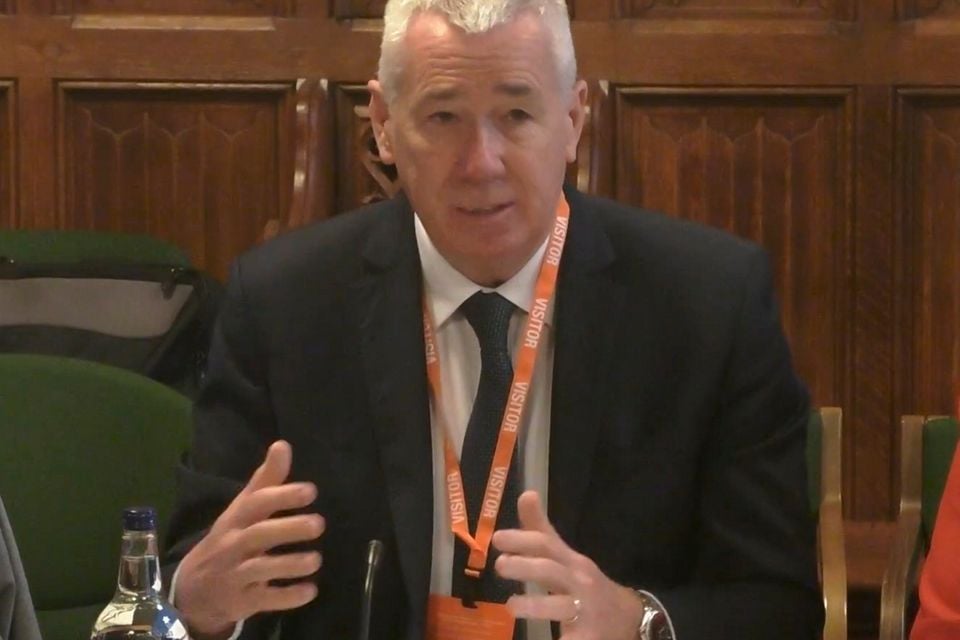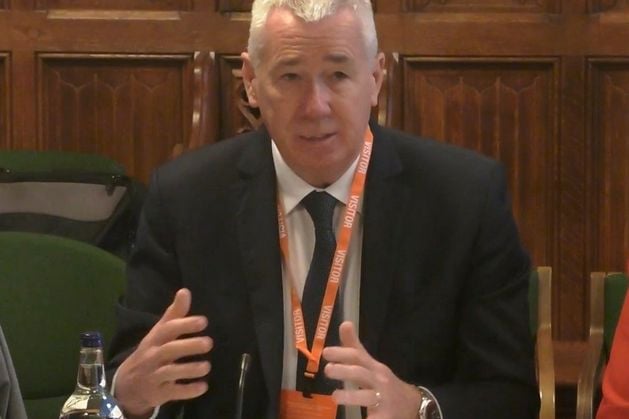Appearing before a parliamentary committee at Westminster on Wednesday, Jon Boutcher described dealing with Northern Ireland’s troubled past as a “millstone” as he admitted “we are not where we should be because we spend so much time looking back at the past.”
“We have been left with this millstone, this anchor, which holds the PSNI back because families, victims, on all sides of the different victims’ profiles, see that lack of action as our fault, our responsibility.
“We are trying to design a plan now to go to the Secretary of State, go to the Executive and try and make sure they don’t just think about the ICRIR, they think about moving society in Northern Ireland forward by trying to help the PSNI do what we were never intended to do, dealing with these legacy issues.
“It is a considerable burden on us.”
Detective Chief Superintendent Claire McGuigan also gave evidence before the Northern Ireland Affairs select committee hearing on ‘The Government’s new approach to addressing the legacy of the past in Northern Ireland” alongside former police ombudsman and member of the House of Lords Baroness Nuala O’Loan and Operation Kenova lead officer Sir Iain Livingstone.

PSNI Chief Constable Jon Boutcher appeared before the Northern Ireland Select Committee in the House of Commons on Wednesday.
Police at the scene of ongoing security alert at Cavehill in north Belfast
Responding to a question from Gavin Robinson about the economic cost to the PSNI of investigating legacy issues, the PSNI chief said the force is spending around £20m a year dealing with legacy issues which he said “would be around 400 police officers.”
“To give you some figures, we have a legacy investigation branch that was the successor organisational unit to the historical inquiry team. That unit costs £5.3m a year to fund.
“We also have ongoing civil cases. That’s over £3m a year that it costs us to deal with those.
“Frankly, its quite a mess.”
Mr Boutcher was critical of the amount of money that was being spent on lawyers and legal costs which is twice as much as what has been paid to victims in civil claims over a six-year period.
“Between 2018 and 2024, the PSNI resolved 30 challenging civil cases,” he said.
“In those cases we paid out to families, claimants, victims, a total of £25m, which we’re not funded for.
“Of that £25m, I’m told that £7.3m went to the victims, the claimants themselves. £17.7m went to the lawyers.
Detective Chief Superintendent Claire McGuigan appeared before the Northern Ireland Select Committee in the House of Commons, London on Wednesday.
“Because we have this attritional approach to legacy by all the security agencies around information disclosure and provision, it creates a greenfield site for lawyers.
“This is public money that the PSNI is not funded for, so it is taking money from contemporary policing.
“Trying to police a post-conflict society, we have to be in schools and communities. We had an incident on Easter Monday with 50 petrol bombs being thrown, children being criminalised.
“We are not where we should be because we spend so much time looking back at the past.”
Mr Boutcher said that costs vary year-on-year as he opined the “millstone” he has been left with.
“We have been left with this millstone, this anchor, which holds the PSNI back because families, victims, on all sides of the different victims’ profiles, see that lack of action as our fault, our responsibility.
“We are trying to design a plan now to go to the Secretary of State, go to the Executive and try and make sure they don’t just think about the ICRIR, they think about moving society in Northern Ireland forward by trying to help the PSNI do what we were never intended to do, dealing with these legacy issues.
“It is a considerable burden on us.”
Under the Legacy Act introduced by the previous UK government, the Independent Commission for Reconciliation and Information Recovery (ICRIR), has taken on the responsibility from the PSNI to carry out investigations into deaths and serious harm related to the Troubles which occurred between January 1 1966 and April 10 1998.
However, MPs were told that the Act had not diminished legacy costs for the force, and may actually increase them.
Mr Boutcher said when policing powers were devolved to Stormont, there was no agreement over how legacy investigations would be funded within the police.
DCS McGuigan, who leads the PSNI’s legacy and disclosure added that the PSNI has been placed under strain by having to largely find funding for legacy issues from their own budgets.
“Over the seven years, if you look at the investigations that we have done, if you look at the civil actions in terms of resourcing them and the compensation, it’s cost around 126 million in totality. That’s quite a significant amount of money.”
“I’m anticipating that the legislative changes are likely to add to that. Not nothing has stopped because of the legacy act. We still have investigations to continue.
“We have over 1100 civil claims to deal with. We don’t have anywhere near the resources to actually research and deal with those, nor the money to settle them.
“We’re really in a position that is very, very, very difficult, and it doesn’t build trust with the community, because it looks like we’re stalling. We’re taking too long to do these things. And of course, then it’s because we don’t want to disclose.
“We simply just don’t have the resources. To get those resources. I’d have to take even more out of contemporary policing, I’d have to go and ask for people to be moved out of contemporary policing, to come in to deal with legacy.
“Nothing has stopped with the legacy act, but the provisions within it are likely to put statutory obligations onto the PSNI.
“With that, and public inquiries that are legacy related, I think we’re looking at another 4-to 5 million on top of that.”
